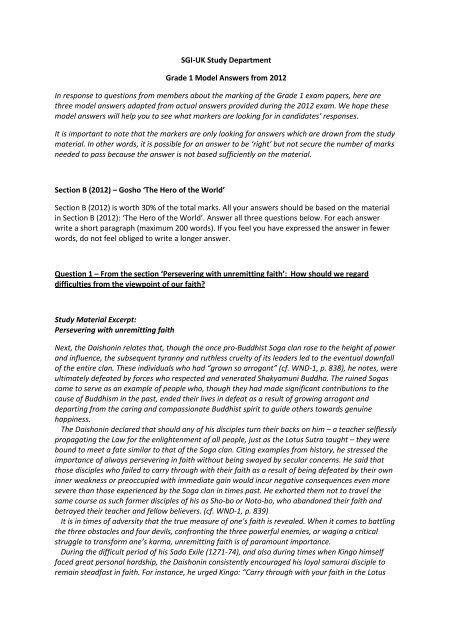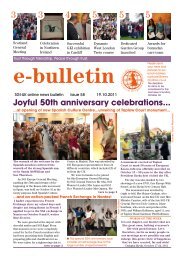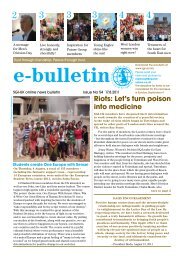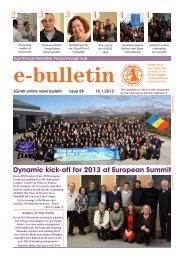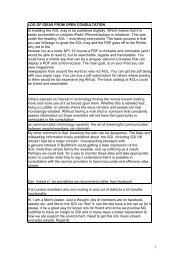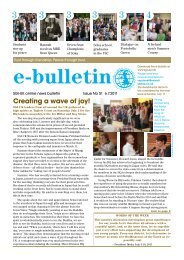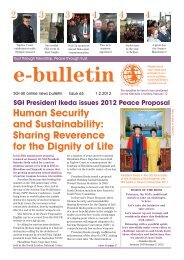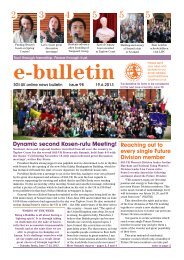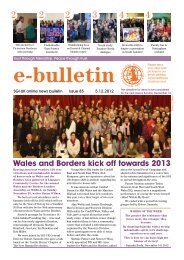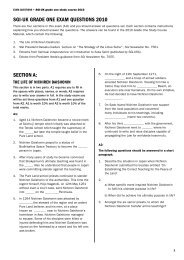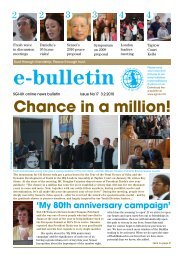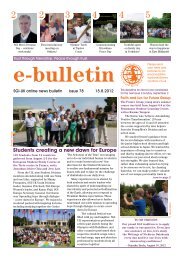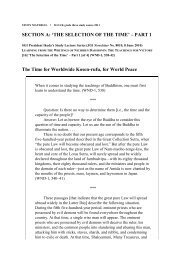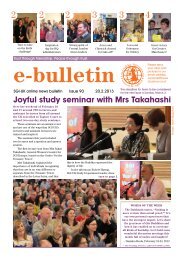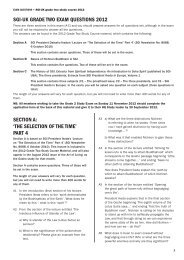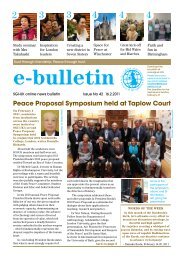Download OR View Model Answers - SGI-UK E-Bulletin and Podcast
Download OR View Model Answers - SGI-UK E-Bulletin and Podcast
Download OR View Model Answers - SGI-UK E-Bulletin and Podcast
You also want an ePaper? Increase the reach of your titles
YUMPU automatically turns print PDFs into web optimized ePapers that Google loves.
<strong>SGI</strong>-<strong>UK</strong> Study Department<br />
Grade 1 <strong>Model</strong> <strong>Answers</strong> from 2012<br />
In response to questions from members about the marking of the Grade 1 exam papers, here are<br />
three model answers adapted from actual answers provided during the 2012 exam. We hope these<br />
model answers will help you to see what markers are looking for in c<strong>and</strong>idates’ responses.<br />
It is important to note that the markers are only looking for answers which are drawn from the study<br />
material. In other words, it is possible for an answer to be ‘right’ but not secure the number of marks<br />
needed to pass because the answer is not based sufficiently on the material.<br />
Section B (2012) – Gosho ‘The Hero of the World’<br />
Section B (2012) is worth 30% of the total marks. All your answers should be based on the material<br />
in Section B (2012): ‘The Hero of the World’. Answer all three questions below. For each answer<br />
write a short paragraph (maximum 200 words). If you feel you have expressed the answer in fewer<br />
words, do not feel obliged to write a longer answer.<br />
Question 1 – From the section ‘Persevering with unremitting faith’: How should we regard<br />
difficulties from the viewpoint of our faith?<br />
Study Material Excerpt:<br />
Persevering with unremitting faith<br />
Next, the Daishonin relates that, though the once pro-Buddhist Soga clan rose to the height of power<br />
<strong>and</strong> influence, the subsequent tyranny <strong>and</strong> ruthless cruelty of its leaders led to the eventual downfall<br />
of the entire clan. These individuals who had “grown so arrogant” (cf. WND-1, p. 838), he notes, were<br />
ultimately defeated by forces who respected <strong>and</strong> venerated Shakyamuni Buddha. The ruined Sogas<br />
came to serve as an example of people who, though they had made significant contributions to the<br />
cause of Buddhism in the past, ended their lives in defeat as a result of growing arrogant <strong>and</strong><br />
departing from the caring <strong>and</strong> compassionate Buddhist spirit to guide others towards genuine<br />
happiness.<br />
The Daishonin declared that should any of his disciples turn their backs on him – a teacher selflessly<br />
propagating the Law for the enlightenment of all people, just as the Lotus Sutra taught – they were<br />
bound to meet a fate similar to that of the Soga clan. Citing examples from history, he stressed the<br />
importance of always persevering in faith without being swayed by secular concerns. He said that<br />
those disciples who failed to carry through with their faith as a result of being defeated by their own<br />
inner weakness or preoccupied with immediate gain would incur negative consequences even more<br />
severe than those experienced by the Soga clan in times past. He exhorted them not to travel the<br />
same course as such former disciples of his as Sho-bo or Noto-bo, who ab<strong>and</strong>oned their faith <strong>and</strong><br />
betrayed their teacher <strong>and</strong> fellow believers. (cf. WND-1, p. 839)<br />
It is in times of adversity that the true measure of one’s faith is revealed. When it comes to battling<br />
the three obstacles <strong>and</strong> four devils, confronting the three powerful enemies, or waging a critical<br />
struggle to transform one’s karma, unremitting faith is of paramount importance.<br />
During the difficult period of his Sado Exile (1271-74), <strong>and</strong> also during times when Kingo himself<br />
faced great personal hardship, the Daishonin consistently encouraged his loyal samurai disciple to<br />
remain steadfast in faith. For instance, he urged Kingo: “Carry through with your faith in the Lotus
Sutra. You cannot strike fire from flint if you stop halfway.” (WND-1, p. 319) He also told him: “To<br />
accept is easy; to continue is difficult. But Buddhahood lies in continuing faith. Those who uphold this<br />
sutra should be prepared to meet difficulties.” (WND-1, p. 471)<br />
Difficulties forge our faith <strong>and</strong> strengthen our character. They are inescapable obstacles that we<br />
have to surmount on the road to attaining Buddhahood in this lifetime. If we persevere in faith <strong>and</strong><br />
overcome every obstacle, the laurels of victory will definitely await us. The important thing is that we<br />
never discard our faith. The Daishonin’s strict compassion for Shijo Kingo is particularly evident in this<br />
section of “The Hero of the World”.<br />
<strong>Model</strong> answer to this question:<br />
From the perspective of our Buddhist faith we are fortunate to be able to regard all difficulties as<br />
opportunities to prove the power of our practice by transforming the ‘poison’ of whatever we are<br />
struggling with into ‘medicine’, that is, to transform our negative situation into happiness. Negativity<br />
in the form of the three obstacles <strong>and</strong> four devils is an inevitable part of life. Difficulties forge our<br />
faith <strong>and</strong> strengthen our character. They are inescapable obstacles we must face <strong>and</strong> surmount on<br />
the road to attaining Buddhahood in this lifetime. If we persevere in faith <strong>and</strong> overcome every<br />
obstacle in life, the laurels of victory will definitely await us. The important thing is that we never<br />
discard our faith. Nichiren Daishonin illustrated this to Shijo Kingo reminding him that you cannot<br />
strike fire from flint if you stop halfway. Shijo Kingo could have either ab<strong>and</strong>oned his faith in the<br />
Lotus Sutra <strong>and</strong> Nichiren Daishonin, or lose his position, his home <strong>and</strong> his livelihood. The Daishonin<br />
reminded him that in such circumstances he must persist with his faith <strong>and</strong> that the wise will rejoice<br />
in the face of obstacles, while the foolish will retreat. [193 words]<br />
Question 2 – From the section ‘Forging inner strength <strong>and</strong> maintaining resolute faith’: What is the<br />
guideline that the Daishonin gives Shijo Kingo to achieve victory?<br />
Study Material Excerpt:<br />
Forging inner strength <strong>and</strong> maintaining resolute faith<br />
Here, the Daishonin cautions Kingo against being ruled by his emotions <strong>and</strong> acting rashly. He<br />
instructs him neither to bow to harsh intimidation nor to let an outwardly benign attitude on his<br />
lord’s part lull him into a false sense of security <strong>and</strong> cause him to adopt a conciliatory stance – or, in<br />
either case, Kingo would be giving in to Ema’s dem<strong>and</strong>s <strong>and</strong> end up discarding his faith. Out of his<br />
sincere wish to protect his disciple, the Daishonin offers detailed advice on how to wisely h<strong>and</strong>le the<br />
situation.<br />
Untempered iron will melt in a blazing fire, but a finely forged sword will not, says the Daishonin.<br />
With this admonition, he seeks to forge Kingo’s faith <strong>and</strong> inner resolve.<br />
We cannot achieve victory in a true sense if we are constantly vacillating between hope <strong>and</strong> fear over<br />
what might await us in the future. Buddhism is reason. Only when we approach life with a serene,<br />
unclouded state of mind – forged through cultivating inner strength <strong>and</strong> polishing our faith – can we<br />
truly bring forth from within us the wondrous workings of life that put us on a course to victory.<br />
Constantly polishing <strong>and</strong> strengthening ourselves through faith – this path of inner selfdevelopment<br />
based on the Mystic Law is the direct path to genuine victory in life. For us of the <strong>SGI</strong><br />
today, this entails our regular practice of morning <strong>and</strong> evening gongyo <strong>and</strong> carrying out activities for<br />
kosen-rufu. It is through these continued efforts <strong>and</strong> the progress we make in our own human<br />
revolution that we open the door to victory.
The Daishonin then provides an unerring road map to guide Kingo to victory, by saying: “Buddhism<br />
is reason. Reason will win over your lord.” (WND-1, p. 839) Those who live their lives with honesty<br />
<strong>and</strong> integrity based on faith in the Mystic Law will win in all areas as a matter of course. “Win over<br />
your lord” here means that even Lord Ema – who wielded power over the lives of Shijo Kingo <strong>and</strong> his<br />
other retainers by administering rewards <strong>and</strong> punishments – would be no match for the lucid<br />
principles of Buddhism.<br />
Depending on how the situation unfolded, however, the need might arise for Shijo Kingo to risk his<br />
life <strong>and</strong> admonish the error of his lord. It was for this purpose that the Daishonin composed a letter of<br />
petition on Kingo’s behalf, denouncing the priest Ryokan15 of Gokuraku-ji temple, [who was active<br />
behind the scenes in the persecution of Shijo Kingo following the Kuwagayatsu Debate <strong>and</strong>] whose<br />
teachings Lord Ema esteemed.<br />
In terms of Buddhism, Ryokan was a source of great evil [in disseminating erroneous teachings <strong>and</strong><br />
leading people astray from the correct path to enlightenment]. Only by thoroughly repudiating evil<br />
can it be subsumed by good.<br />
The Daishonin, therefore, to be doubly sure, strongly emphasizes to Kingo again that he must on no<br />
account discard his faith out of a reluctance to part with his estate. Essentially, this represents a<br />
solemn admonition to persevere in faith, no matter what happens. The Daishonin offers Kingo a clear<br />
guideline: when forced to make a life-<strong>and</strong>-death choice, choose faith, which is the foundation for<br />
everything. Such an unfaltering resolve is crucial in times of great adversity.<br />
Of course, if Kingo were to relinquish his estate <strong>and</strong> retire from his lord’s service in a negative or<br />
angry frame of mind, it would not constitute a genuine solution. Though on the surface it might seem<br />
he was acting based on faith to sever ties with an unjust feudal lord, in reality it would be nothing<br />
more than him being defeated by his own weakness.<br />
For Kingo, “winning over his lord” meant remaining steadfast in faith, conducting himself with<br />
integrity <strong>and</strong> sincerity, <strong>and</strong> eventually awakening Ema to the correct teaching of Buddhism.<br />
<strong>Model</strong> answer to this question:<br />
Nichiren Daishonin provided Shijo Kingo with an unerring road-map to guide him to victory by<br />
saying: “Buddhism is reason. Reason will win over your lord.” Those who live their lives with honesty<br />
<strong>and</strong> integrity based on faith in the Mystic Law will overcome every obstacle in life <strong>and</strong> win in all<br />
areas. He meant that the lord will be no match for the lucid principles of Buddhism. Nichiren<br />
Daishonin also strongly emphasised the importance of persevering in faith no matter what. He said<br />
to never ab<strong>and</strong>on his faith even in the midst of a real struggle.<br />
The clear guideline is that when someone is forced to make a life-<strong>and</strong>-death choice, they should<br />
choose faith, which is the foundation for everything. Such an unfaltering resolve is crucial in times of<br />
great adversity. It was also important that Shijo Kingo did not retire from his lord’s service in a<br />
negative or angry frame of mind. To do so would mean being defeated by his own weakness. [164<br />
words]<br />
Question 3 – From the section ’The bonds of mentor <strong>and</strong> disciple in Nichiren Daishonin’s<br />
Buddhism’: How did President Makiguchi <strong>and</strong> President Toda describe winning?<br />
Study Material Excerpt:<br />
The bonds of mentor <strong>and</strong> disciple in Nichiren Daishonin’s Buddhism<br />
“Buddhism means winning” is not simply a motto or maxim. It is the very heart <strong>and</strong> essence of the<br />
mentor-disciple relationship in Nichiren Daishonin’s Buddhism.
In “On Repaying Debts of Gratitude”, the Daishonin writes:<br />
If Nichiren’s compassion is truly great <strong>and</strong> encompassing, Nam-myoho-renge- kyo will spread for<br />
ten thous<strong>and</strong> years <strong>and</strong> more, for all eternity, for it has the beneficial power to open the blind eyes<br />
of every living being in the country of Japan, <strong>and</strong> it blocks off the road that leads to the hell of<br />
incessant suffering. (WND-1, p. 736)<br />
It was through his selfless struggles, carried out in the spirit that Buddhism means winning, that the<br />
Daishonin opened the way for the eternal transmission of the Law into the eternal future of the<br />
Latter Day. It was also in this way that he activated the power of the Law to open the eyes of those<br />
blinded by delusion <strong>and</strong> block off the road to the hell of incessant suffering. For that reason, the<br />
transmission of the Law can only be undertaken by disciples who struggle with the same selfless<br />
dedication as the Daishonin.<br />
In the present age, the <strong>SGI</strong> alone has persisted on the path of faith with the spirit that Buddhism<br />
means winning, as taught by the Daishonin. Indeed, it would be no exaggeration to say that, before<br />
the Soka Gakkai’s appearance, the earnest struggle for inner transformation based on the<br />
Daishonin’s Buddhism – what we of the <strong>SGI</strong> today call human revolution <strong>and</strong> transforming reality –<br />
was nearly completely forgotten.<br />
Tsunesaburo Makiguchi, the first Soka Gakkai president, declared that showing actual proof of<br />
faith through striving <strong>and</strong> triumphing with the spirit that Buddhism means winning is the “lifeblood<br />
of the Daishonin’s Buddhism”. He wrote:<br />
[Clear actual proof of faith] is the lifeblood of the Daishonin’s Buddhism. As Nichiren Daishonin<br />
says: “Buddhism primarily concerns itself with victory or defeat, while secular authority is based on<br />
the principle of reward <strong>and</strong> punishment.” (WND-1, p. 835)<br />
In addition, Mr Toda asserted: “Faith is a struggle against deadlock – for the individual, <strong>and</strong> for<br />
humanity. It is a struggle between devilish functions <strong>and</strong> the Buddha. That is why Buddhism concerns<br />
itself with winning in any struggle.” That was also his spirit when his businesses were in dire straits.<br />
He once said to me: “Daisaku, Buddhism is about winning. Let’s fight with courage, giving it our all as<br />
long as we live. Life is eternal. Proof of our dedicated efforts will definitely appear in some form in<br />
this lifetime.” I have fought in accord with these words. I have produced proof. Therefore, I can<br />
honestly say that I have not the slightest regret.<br />
Mr Toda often used to say: “We are practising the Daishonin’s Buddhism in order to achieve<br />
absolute victory. It is crucial that we win in our jobs <strong>and</strong> in all areas of our life with this resolve.” He<br />
also said: “Buddhism means being victorious. If we’re going to engage in a struggle, we must do so<br />
with thoroughgoing preparation, determination, <strong>and</strong> passion, <strong>and</strong> win without fail.”<br />
And he composed the following poem – the very last one I received from him:<br />
Winning <strong>and</strong> losing<br />
are both<br />
part of life,<br />
but I pray to the Buddha<br />
for final victory.<br />
Embracing the spirit that Buddhism means winning, the first three Soka Gakkai presidents have<br />
triumphed over every obstacle.<br />
Everyone faces the fundamental inner struggle between positive <strong>and</strong> negative impulses – expressed<br />
in Buddhism as the struggle between the Buddha <strong>and</strong> devilish functions. Buddhism is the teaching for<br />
winning in this elemental battle. Our victory ensures that truth <strong>and</strong> justice prevail, <strong>and</strong> also attests to<br />
the correctness <strong>and</strong> validity of Buddhism.<br />
Today, <strong>SGI</strong> members are emerging in ever-increasing numbers around the world. Each of them – as a<br />
person “inheriting the soul of the Lotus Sutra” – is striving with the spirit that Buddhism means<br />
winning.<br />
Disciples are st<strong>and</strong>ing up, taking vibrant action, <strong>and</strong> achieving great victories. We have truly<br />
entered an age when the brilliant achievements of the mentors <strong>and</strong> disciples of Soka encompass the
entire globe. The victorious smiles of our members are a bright source of hope for people everywhere.<br />
Their actual proof of happiness is creating ripple effects that will change the world.<br />
As we embark on a renewed effort to reach out to young people <strong>and</strong> foster the development of an<br />
ever-youthful <strong>SGI</strong> organization, I would like to pass on, from heart to heart, the spiritual baton for<br />
eternal victory to each one of my beloved fellow members.<br />
<strong>Model</strong> answer to this question:<br />
President Makiguchi said that showing actual proof of faith, through striving <strong>and</strong> triumphing with the<br />
spirit that Buddhism means winning is the ‘lifeblood of Nichiren Daishonin’s Buddhism’. President<br />
Toda said that Buddhism concerns itself with winning in any struggle. He also said that we should<br />
fight with courage, giving it our all as long as we live. President Toda also said that we are practising<br />
the Buddhism of Nichiren Daishonin in order to achieve absolute victory in life. It is crucial that we<br />
win in our jobs <strong>and</strong> all areas of our live with this resolve. He said that if we are going to engage in a<br />
struggle then we must do so with thoroughgoing preparation, determination <strong>and</strong> passion <strong>and</strong> win<br />
without fail. [123 words]


